
Living Borussia down under
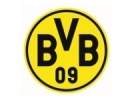 With our personal Twitter channel (@schwatzgelb_com), it is easy to communicate with football fans around the world, especially with fans from our beloved Borussia. That's how we got in contact with four fans from down under, Australia. This is the story of Matt (@mattlmorris), Ben (@BennyONeill), Beatrice (@footballgidget) and Steven (@Gixibyte). Via e-mail, we talked to them about several things, including their passion to Borussia, how they manage to be informed about our club so many miles away, what do they think about our Australian goalkeeper and how they would evaluate both the Australian and the German football league.
With our personal Twitter channel (@schwatzgelb_com), it is easy to communicate with football fans around the world, especially with fans from our beloved Borussia. That's how we got in contact with four fans from down under, Australia. This is the story of Matt (@mattlmorris), Ben (@BennyONeill), Beatrice (@footballgidget) and Steven (@Gixibyte). Via e-mail, we talked to them about several things, including their passion to Borussia, how they manage to be informed about our club so many miles away, what do they think about our Australian goalkeeper and how they would evaluate both the Australian and the German football league.
schwatzgelb.com: Please give a short overview on your person. Who are you, how old are you, where do you live etc.
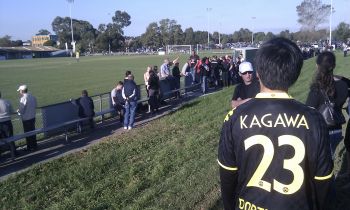 Steven: My name's Steven Chang, I'm 24, and I live in Melbourne, Australia. I support Melbourne Victory, Borussia Dortmund, and Liverpool FC. I'm studying my Masters in librarianship, interested in technology, and am a political activist. I also have a Tumblr - http://gixibyte.tumblr.com/ - where I post football stuff, silly stuff, and photos of Robbie Kruse.
Steven: My name's Steven Chang, I'm 24, and I live in Melbourne, Australia. I support Melbourne Victory, Borussia Dortmund, and Liverpool FC. I'm studying my Masters in librarianship, interested in technology, and am a political activist. I also have a Tumblr - http://gixibyte.tumblr.com/ - where I post football stuff, silly stuff, and photos of Robbie Kruse.
Ben: My name is Ben O'Neill and I am 22-years-old. I live in Newcastle, Australia.
Beatrice: I'm 21, live in the south-east suburbs of Melbourne. Looking to study Exercise Science at uni.
Matt: My name is Matt Morris, I'm 26 years old and I live in Melbourne, Australia.
I manage a Market Research call centre, but with other parts of my life I am completely football mad. I am a Melbourne Victory (A-League), Richmond Eagles (State-League), Newcastle United (EPL) & Borussia Dortmund fan; but not necessarily in that order. I write a blog on Australian website http://au.fourfourtwo.com about fan culture in Australia and am also the inaugural chairman of a fan advocacy organisation called Football Supporters Federation Australia.
schwatzgelb.com: For how long have you been a fan of Borussia? When did you first come across the BVB and what was your first reaction?

Matt: I have been a fan of BVB since 2001. I was living in Ibbenbüren on exchange and was looking for some football to watch. My host sister wasn't a football fan but had heard that BVB was the best that was close to the town. We got some beer, got on a train and headed down to Dortmund. Fantastic city, fantastic stadium (even pre-2006 World Cup) and I couldn't believe how LOUD the fans were. This was before the time of the A-League in Australia, so I was used to maximum crowds in the old NSL of 2,000-3,000 for my local team (Now kaput Gippsland Falcons). The stadium was like nothing I had seen before. My second reaction was how friendly everyone was. In Australia when I was growing up we were always told to be careful of football fans because they are all violent, angry and fascist which I learned very quickly was not true at all. My most memorable experience with my time going to BVB games was always the train heading back towards Ibbenbüren after winning a game. Everyone on the train was singing & happy and included me no longer as a stranger, but a brother. BVB fans helped me fall back in love with football and fan culture and I will always grateful for that.
Steven: I've gone through different stages of affection for BVB. I've been aware of the club since the early 2000s. I followed it for years, liked players such as Christoph Metzelder, Dede, Ewerthon, and of course Sebastian Kehl. But took a long time to become a "real" fan – the main reason being that it's always been hard to follow Bundesliga from Australia. They haven't shown it on any of the main TV channels until recently, and even now, it's very limited coverage. I would say I became a "serious" BVB fan ever since I started finding ways of watching Bundesliga football through internet streams in the last couple of years. Once I was able to watch my team live, my passion skyrocketed. It also helped that Mitch Langerak moved to the club.
Beatrice: As soon as I heard Mitch Langerak was transferring to Dortmund I decided to follow them very closely. It was so easy to fall in love with the club whose players having such strong individual character. And the support and atmosphere created by the fans at home and away matches is amazing.
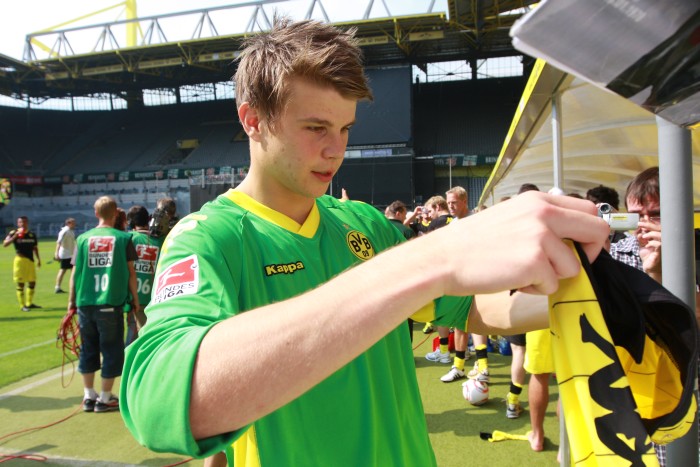 schwatzgelb.com: What was your reaction when you heard of Australian keeper Mitch Langerak changing teams to Borussia?
schwatzgelb.com: What was your reaction when you heard of Australian keeper Mitch Langerak changing teams to Borussia?
Beatrice: At first I was totally devastated but over a bit of time I understood that it was the best thing for him. And that moving to Europe helps his chances of playing for Australia greatly.
Matt: Both very happy and very sad at the same time. He played for my club in Melbourne and was the best keeper we had brought up in a very long time. He was competing against the first choice keeper for New Zealand (Glenn Moss) and asserted his place and never lost it until he left for Dortmund. We see young Australian players making the wrong choices with clubs in Europe because they are so desperate to have immediate success, but having Klopp at BVB and knowing his youth philosophy gave me belief that Mitch was making the correct decision – nearly 1 year later it looks like my belief was correct.
schwatzgelb.com: What do you think of Langerak and what is the general impression people in Australia have about him?
Matt: I think he is an excellent kid with a good mixture of humility & humour. In terms of football, there's no doubting his ability as a goalkeeper.
Ben: Everyone who is avid about football in Australia understands just what an amazing talent Mitch is. His performances in the A-League put him on the radar of all football fans, and this was backed up by his much-hyped debut against Bayern Munich last month. I can't remember as much hype in the Australian football media about a player making his debut for a new club since Harry Kewell left Leeds for Liverpool.
schwatzgelb.com: Do you see Mitch as the follower of Schwarzer?
Ben: Australia is blessed with a number of very talented goalkeepers who ply their trade in numerous leagues around the world. Langerak is one of a few keepers who could take over from Schwarzer when the great man finally calls it a day. At this stage, it is important Langerak continues to learn from the likes of his teammates Roman Weidenfeller and Mark Schwarzer, and his coaches (Klopp and Holger Osieck). Then, with more games and experience at club level under his belt, he will be ready to be the first choice keeper for the Socceroos perhaps in Brazil 2014, but if not then, definitely in Russia 2018 and even Qatar 2022.
Steven: Maybe. Probably. Depends what you mean by follower. Schwarzer also went to Germany for a short period at Kaiserslautern when he was younger and not as established as he is today in England. I believe Langerak will be a future #1, but he faces stiff competition, as Australia produces very good goalkeepers for some reason.
Matt: It's hard to say if Mitch will come into line to be the natural successor to Schwarzer because there are so many good goalkeepers that come out of Australia including Adam Federici at Reading and Brad Jones at Liverpool who are a bit older than Mitch, but under 30.
schwatzgelb.com: Do you think the general interest in Langerak and BVB have risen after the transfer?
Matt: I definitely see more fangirls on Tumblr posting shirtless photos of him these days. The football media still follows him closely, and there were a lot of stories around him making his debut against Bayern both before and after the game.
Ben: Very much so. A lot of football fans in Australia probably don't follow the Bundesliga as much as we do, but they all know Bayern Munich from their success in the UEFA Champions League. So, when Langerak made his debut in front of a full house in Munich's Allianz Arena, Australian football fans knew it was a very big deal indeed. Media coverage of Langerak went into overdrive, and as a result, general interest in Langerak's progression, and knowledge of BVB as a top club in Germany, has risen.
schwatzgelb.com: Are there many people in Australia following Borussia? If so, why do they do that? And how do they think about the black-yellowed?
Steven: Not that many. There are a tiny minority of us who followed BVB before Langerak's transfer. And a slightly larger minority that now follow BVB because of Langerak's arrival. But still, Australian football fans are overwhelmingly interested in the EPL and follow big English clubs. If there was more Bundesliga on Australian TV, maybe this would change. In general, I don't think that many people know much about the club. They know it's a good club, that Langerak plays there, some will know Dortmund won the Champions League in 1997. I don't think many could name more than a couple of our players.
Ben: Borussia Dortmund experiences a small, niche following in Australia. A few of us converse regularly on Twitter, and obviously we think very positively about the club. I think the more matches Australians see Langerak play for Dortmund at the Signal Iduna Park in front of their vociferous fans, the more Australian fans Dortmund will have. It hasn't hurt that Dortmund have performed so well this season, too.
Matt: BVB has always been well thought of because of the fan culture, but I think there are now more, especially in Melbourne, after the Mitch transfer. In terms of supporters of the teams I don't think there were that many in Australiabefore Mitch transferred, so it's more of a respect and awe of the Südtribüne.
 schwatzgelb.com: How do you manage to follow the club so many miles away? Do you watch the matches? If so, what possibilities do you have to watch?
schwatzgelb.com: How do you manage to follow the club so many miles away? Do you watch the matches? If so, what possibilities do you have to watch?
Beatrice: I try to watch their matches as much as I can. It is difficult when kick off is usually around 4:30am, but when I do watch it's through online streaming on my laptop.
Steven: I rely mostly on the internet and Twitter. I talk to @schwatzgelb_com and other Dortmund fans on Twitter like @SanBorussia, @BVBawesome, and others. I watch most of the matches live, but it's tough for me, because Australian time they start either at 2:00am or 4:30am, etc. Again, I rely on the internet to stream the matches, which is frustrating! But occasionally one of our channels, OneHD, will show Dortmund matches live.
Matt: Sometimes the matches are on TV in the middle of the night, but usually I only get to see the highlights on websites and there's a Bundesliga highlight show on PayTV here. I'm also really thankful to the official club website and schwartzgelb.com for having English language versions, because meine deutsch sind nich so güt.
schwatzgelb.com: How would you evaluate the professional Australian soccer league? What are strengths and weaknesses? How big is the interest for football in Australia anyway?
Steven: The main thing to keep in mind is "soccer" in Australia competes with Aussie rules "football" (AFL). It's hard for people outside Australia to understand, but AFL is THE main sport here. People are crazy about it. The top AFL clubs here attracts the same crowd numbers as Dortmund. Interest in football is high, but the A-League is managed poorly by the ruling football organisation. Its strengths are that it is increasing in quality, and is producing some good players. Its weaknesses are a very poor approach to fans by football adminstrators, and significant financial problems. For example, Melbourne Victory is the only A-League club to make any profit at the end of a season, all the other clubs suffer financial losses. Also, the A-League is only 6 years old, which is obviously extremely young compared to European leagues.
Ben: Australian professional football is still finding its feet. One of its strengths this season has been the introduction of many good foreign players into the league – including a German player by the name of Thomas Broich – which has helped elevate its level of play. Its weaknesses include poor crowd attendances.
Matt: The league is only new and has lots of growth potential, but there are a lot of problems with the administration of the league. The on field quality is getting better and better, and the 2010/11 season that just finished was the best in terms of quality that Australia has seen for a very long time, if not ever.
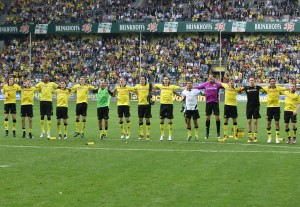 schwatzgelb.com: In comparison: What do you think of the Bundesliga?
schwatzgelb.com: In comparison: What do you think of the Bundesliga?
Steven: I think the Bundesliga is under-rated by many people. Everyone adores the EPL, La Liga, Serie A, but don't realise how good the Bundesliga is.
Compared to A-League? There's no comparison. The Bundesliga is far superior in every aspect – the football, stability, and the fan culture.
Matt: Hopefully one day we can compare the A-League to the Bundesliga, but right now German football is superior in every way including ticket prices, community ownership of clubs and fan culture.
schwatzgelb.com: How would you describe the fan culture in Australia?
Ben: Fan culture, like football in Australia, is growing. Some clubs, such as Mitch Langerak's old team, Melbourne Victory, have very good 'ultra-style' support. However as a general rule, fans in Australia not exposed to football culture from places such as German, Eastern Europe or even Japan fail to grasp the idea of singing for the full 90 minutes, creating banners, performing tifos, etc.
Steven: Melbourne Victory has the strongest fan culture in the A-League (even our rivals will agree with this), with a vibrant terrace culture. A couple of other clubs like Adelaide United have a colourful fan culture too. But outside 3-4 clubs, it's nothing like Europe at all. You often have sub-10,000 crowds, and don't see the same features of European football like big tifos and stuff. Also, the most active fans, like at Melbourne Victory, have been targeted by the police recently, which makes it hard.
Matt: Right now fan culture is small and fragmented, and I'm not sure that ultra fans are growing in number as we have been actively targeted by police, security and the Football Federation for unfair restrictions and abuse of power. Much of the problems come from Football fan culture being very different from AFL, Rugby or Cricket culture where there is much less passion and noise at games. Some of us are working very hard to change these perceptions and give the Federation, security and police more understanding that we are just passionate and not hooligans, but it is a very long and hard road.
schwatzgelb.com: From an outside point of view: How would you evaluate the fan culture in Germany in general and what impressions do you have about the supporters of Borussia Dortmund?
Ben: Fan culture in Germany is impressive. I know a Hannover 96 fan that lives in Uslar who travels to every away game via local train or car. This can mean over six hours each way to watch his team. Many Australian fans simply wouldn't do this and I know that this case is not an exception – which is what makes German fans so great. I have a good impression of BVB fans. 'The Unity' are awesome, man! 26,000-odd people standing, singing, jumping, at one end of the ground! Most A-League games don't even go close to having 26,000 spectators.
Steven: Wonderful. One of the reasons Bundesliga football is so appealing to me is its fan culture. I love seeing photos and videos of BVB supporter culture – every time I see videos of you guys singing YNWA or Heja BVB or Ale Ale Ale Ale Oh it sends shivers of excitement down my neck. I can't describe to you how hard it is for me to imagine the experience of stepping into a stadium with 80,000 fans with massive banners and tifos and 90 minutes of singing. But it's probably not fair to compare with Australian fan culture. A better comparison is with England. For some reason, the supporter culture in England doesn't appeal to me that much. Almost all German clubs seem to have an amazing, distinctive culture of support with drums, banners, flags, it's just incredible both visually and hearing the singing/chanting too. I just feel it's better than in the EPL.
 schwatzgelb.com: What do you think about the BVB's performance in national and international competition so far?
schwatzgelb.com: What do you think about the BVB's performance in national and international competition so far?
Matt: Sometimes I can't believe what has happened this year. I get annoyed when I hear pundits talk about why Bayern are failing rather than Dortmund succeeding.
Ben: Obviously this season has been fantastic in the Bundesliga however the team disappointed in the Europa league. Although, one should ask if BVB would have performed as well in the Bundesliga if they had to travel and play so many games in the Europa league this year? Perhaps, it was a blessing in disguise! I can't wait to watch BVB in the Champions League next season and hope to see a game in Germany between October and December later this year.
schwatzgelb.com: Are there any Australian players you would like to see in the Bundesliga?
Steven: All of them. Well, my favourite player in the world, Robbie Kruse, has just joined Fortuna Dusseldorf in 2. Bundesliga. So while I'm heartbroken to see him leave, I'm happy that he's going to a German club. Matthew Leckie, a very skilled winger from Adelaide United, is also going to Borussia Monchengladbach.
Matt: I would like to see more young players developing in the Bundesliga, because too often young players make the mistake of going to England or Turkey or somewhere else that youth is not valued as much as it should be an end up in the lower leagues that are not superior to the A-League for development. At the moment we have Nikita Rukavitsya at Hertha BSC and Dario Vidosi? at Duisburg (I think) as well as Mitch. Next season there are some more coming over like Melbourne boy winger Matthew Leckie going to Gladbach and Steven's favourite pretty boy striker Robbie Kruse going to Fortuna Düsseldorf. Of course we can't forget Mustafa Amini. Australia has some very good technical youth players that could do very well to develop in Germany. In Melbourne some players with potential to look out for are Maté Duganzic, Aziz Behich, Nick Kalmar, Matthew Foschini, Jimmy Jeggo, Adrian Zahra
schwatzgelb.com: What can you tell us about Mustafa Amini who trained for Borussia last week?
Matt: Musti played for Central Coast Mariners in the A-League last season and became a bit of a cult hero. There were lots of fans wearing red wigs to games.
Ben: Mustafa Amini is an exciting young talent who plays as a number 10. He is only 17 or 18, however has impressed in his first season in the A-League. He is thought of very highly by many in the Australian football media, and the National Team boss Holger Osieck. I would suggest that if Dortmund were to sign Amini, you wouldn't see him in the first team for some while though. It is one thing for Amini to do well in the A-League at 17, but I think it would take at least three years for him to learn and improve before he could match it at 1.Bundesliga level.
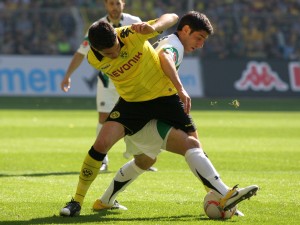 schwatzgelb.com: What are your favorite players of BVB and in general?
schwatzgelb.com: What are your favorite players of BVB and in general?
Beatrice: Besides Mitch, I really like Mats Hummels. He's similar to my favourite Melbourne Victory player Adrian Leijer, a tall defender who isn't scared of going up front and scoring goals.
Steven: My favourite BVB player is Shinji Kagawa. I also love Sven Bender, Mario Gotze, Mitch Langerak, Dede, Sebastian Kehl, and Nuri Sahin. I love the whole bloody squad actually. Also Marcel Schmelzer is starting to grow on me.
Ben: Two of my favourite current players at BVB are Kuba and Nuri Sahin. Before he left, I loved Tinga. Tinga is one player who may not be a big name, but I believe could come to Australian football and people would say, 'wow!' I also like Australians who play and have played at the club, of course – Langerak and Ned Zelic!
Matt: My current favourite BVB player is Kuba. I can't explain why, he just is. I am enjoying watching Shinji become a Dortmund hero, too. I like watching local products like Kevin coming through. I admire his humility and his respect for the fans that he was once a part of.
schwatzgelb.com: How would you evaluate the future of Borussia with Champions League probably coming next year? Do you think we are in need of new players?
Matt: Champions League will be tough, and the club needs to be careful not to spend too much on players chasing success again and risk another downward spiral that we are finally recovering from after so many years. I really enjoy watching the current young players have fun with what they are doing for the fans and for each other. I don't think we should take that away from them with too much pressure and unrealistic expectations.
Ben: It is always important to strengthen the team and I believe with the money that will be received from qualification for the Champions League, new players should be bought. It is still possible Kagawa or other players may be tempted away from the Signal Iduna Park for large sums of money, and if they are it is important to bring in quality replacements. Players with proven Champions League experience may be useful as most of BVBs current players have yet to play in that particular competition.
Vanni, 06.03+1.2011
[[$comments]]



